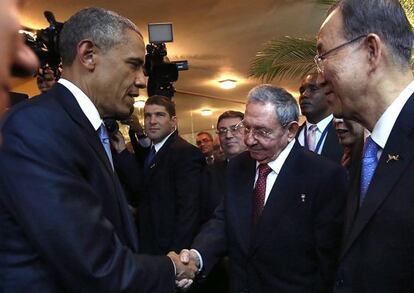Obama gives green light to remove Cuba from state sponsors of terror list
US president notifies Congress of his decision, which goes into effect in 45 days


United States President Barack Obama notified Congress on Tuesday of his decision to remove Cuba from the list of state sponsors of terrorism – an important and long-awaited step in the process toward normalizing diplomatic relations that began on December 17, 2014.
The president announced his decision three days after his historic meeting with Cuban President Raúl Castro at the Summit of the Americas in Panama, the first formal encounter between the leaders of the two countries in half a century, a moment that represented a radical change in bilateral relations.
Havana welcomed Obama’s announcement as a “fair” decision
“The Cuban government recognizes this fair decision made by the president of the United States to eliminate Cuba from a list it should never have been included on,” said Josefina Vidal, the island’s chief negotiator in Washington. “Cuba rejects and condemns acts of terrorism in all forms and manifestations including any action aimed at encouraging, supporting, financing or covering up terrorist acts,” she said in a statement.
Cuba was placed on the US State Department’s black list in 1982 for supporting armed Marxist groups in Latin America as well as elements of ETA and the Revolutionary Armed Forces of Colombia (FARC) to whom it gave refuge on its territory. Since the beginning, Havana has condemned its presence on a list that invites economic and political sanctions as “unjustifiable.”
Cuba black list decision draws applause and criticism
Although it was expected, US President Barack Obama’s decision to remove Cuba from the list of state sponsors of terror has met with a flood of reactions from Congress – some positive and others highly critical. Lawmakers have 45 days to try to override the move, but it will be a difficult task.
Florida Republican Senator and presidential candidate Marco Rubio – he announced his bid for the White House last Monday – stands out among the critics, calling the Obama's decision "terrible."
“Cuba is, without a doubt, a country that supports terrorism,” said Rubio, who is of Cuban descent. The White House’s decision “sends a chilling message to our enemies abroad that this White House is no longer serious about calling terrorism by its proper name.”
Florida Republicans Mario Díaz Balart and Ileana Ros-Lehtinen, who are also of Cuban descent, decried the decision as “shameful,” saying that it not only puts national security at risk but also means caving in to demands from the Cuban government.
Support or criticism of Obama’s decision is more than just a Republican versus Democrat issue. It is a question of ideals that transcend party lines, which is why Democratic Senator Bob Menéndez, who is of Cuban descent, also criticized the president. ““Taking Cuba off of the list of the state sponsors of terrorism sends the wrong message to Cuba and sends the wrong message to other state sponsors of terrorism,” he said.
On the other hand, Republican senator Jeff Flake, who has actively supported resetting diplomatic relations with Cuba, welcomed the decision as a positive move that was “long past time.”
Nancy Pelosi, the Democratic minority leader in the House of Representatives, congratulated Obama on making a “move [that] continues the historic normalization of relations between our countries. It will facilitate the opening of new markets for American banks and businesses, and new opportunities for the people of Cuba.”
Given that only Congress can lift the embargo, Cuba’s removal from the black list will have little practical impact on sanctions. But it could help the Cuban Interests Section in Washington find a bank to handle its financial operations, something it has not been able to do since its last bank stopped working with the country more than a year ago. For Havana, getting off that list was also a question of political prestige.
Obama’s message to Congress certifies that “the government of Cuba has not provided any support for international terrorism during the preceding six-month period,” and “has provided assurances that it will not support acts of international terrorism in the future.”
These were the legal requirements to remove Cuba from the list. The decision will go into effect in 45 days from Tuesday. Meanwhile, Congress could try to roll back the process through a joint resolution by both houses. In order to bypass Obama’s veto power, lawmakers would need strong majorities – something that would be hard to achieve given that a large number of Democratic and Republican congressmen support renewing relations with Cuba and many in Latin America have rallied for this change in policy.
The only thing missing was the presidential go-ahead. State Secretary John Kerry, who was tasked with reviewing the Cuban issue the day Obama and Castro announced that their administrations would relaunch diplomatic relations, recommended taking Cuba off the list last week. In fact, Obama had been expected to take advantage of the historic meeting with Rául Castro in Panama while they were hogging the spotlight at the summit to announce his decision.
Cuba’s removal from the list, which includes countries such as Iran, Sudan, and Syria, was not a surprise as the Department of State had some time ago began acknowledging Havana’s cooperation with Madrid and Bogota. Cuba is currently hosting the peace talks between the Colombian government and FARC.
“We will continue to have differences with the Cuban government, but our concerns over a wide range of Cuba’s policies and actions fall outside the criteria that is relevant to whether to rescind Cuba’s designation as a state sponsor of terrorism,” White House Press Secretary Josh Earnest said in a statement.
“Circumstances have changed since 1982, when Cuba was included because of its efforts to promote armed revolution by forces in Latin America,” said Kerry. “Our hemisphere, and the world, look very different today than they did 33 years ago.”
The next step should be reopening embassies in Washington and in Havana but these changes have met with some resistance though neither party has given any reason for the delay. Both governments have said that Cuba’s removal from the list and the reopening of embassies are relatively easy parts of a process that they expect to be long and difficult.
Tu suscripción se está usando en otro dispositivo
¿Quieres añadir otro usuario a tu suscripción?
Si continúas leyendo en este dispositivo, no se podrá leer en el otro.
FlechaTu suscripción se está usando en otro dispositivo y solo puedes acceder a EL PAÍS desde un dispositivo a la vez.
Si quieres compartir tu cuenta, cambia tu suscripción a la modalidad Premium, así podrás añadir otro usuario. Cada uno accederá con su propia cuenta de email, lo que os permitirá personalizar vuestra experiencia en EL PAÍS.
¿Tienes una suscripción de empresa? Accede aquí para contratar más cuentas.
En el caso de no saber quién está usando tu cuenta, te recomendamos cambiar tu contraseña aquí.
Si decides continuar compartiendo tu cuenta, este mensaje se mostrará en tu dispositivo y en el de la otra persona que está usando tu cuenta de forma indefinida, afectando a tu experiencia de lectura. Puedes consultar aquí los términos y condiciones de la suscripción digital.








































